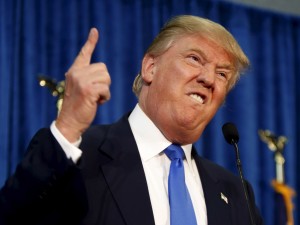 Donald J. Trump, the New York billionaire, has the political world on a string. If he wins Ohio and Florida on March 15 (as I write, polls have him leading in both states), Trump will emerge as the Republican Party’s presumptive presidential nominee. Typing that sentence six months ago was fantastical. Six years ago and it could have been a comic sketch opening. But now, it is on the verge of happening. How?
Donald J. Trump, the New York billionaire, has the political world on a string. If he wins Ohio and Florida on March 15 (as I write, polls have him leading in both states), Trump will emerge as the Republican Party’s presumptive presidential nominee. Typing that sentence six months ago was fantastical. Six years ago and it could have been a comic sketch opening. But now, it is on the verge of happening. How?
Trump is fortunate in his opponents. Not only did the sheer size of the field fragment their support, but large slices of the GOP electorate are starved for change. This handicapped his most capable rivals—Bush, Perry, Jindal, Kasich, and Walker. In most years, Ted Cruz and Marco Rubio would be audacious candidates—lightly experienced, eloquent, staunchly conservative U.S. Senators that bring diversity to the party—but not this year. As outsiders, they cannot match Trump’s magnetic idiosyncrasies.
While Barack Obama may safely qualify as the inaugural internet president, Trump is the first social media adept. Trump aims his seven million Twitter followers at a target rich environment. He does not delegate social media duties to a staffer, but instead presents himself unfiltered to the masses. He insults. He jabs. He revels. More critically, Trump’s tweets on social media influence news cycles and destabilize his opponents, who are forced to respond to his 140 character diatribes.
Trump’s mastery of social media swiftly translated into traditional media dominance. Trump is, if nothing else, entertaining. He generates clicks and is impossible to ignore. Those who despise him still watch if only to stew in their disdain. As CBS Executive Chairman Les Moonves confessed, Trump “may not be good for America,” but he is good for CBS. After victories in Michigan and Mississippi, Fox News slavishly covered Trump’s wallowing infomercial that doubled as a press conference. This choice followed revelations that Roger Ailes, the network’s potentate, declared the network “finished” with Marco Rubio. Trump’s cachet is so complete that Sunday news shows, where hard news reigns, often allow Trump to phone in, literally and figuratively in some cases, his interviews. Those who falsely labor under the notion that news outlets bear some civic responsibility to “report the facts” or to “be fair” to the candidates and their views can harbor no such illusions after this election season. Like it or not, news is a business and Donald Trump is good for business.
With Donald Trump and Bernie Sanders waging insurgent campaigns, many observers rely on “establishment” and “anti-establishment” labels to explain and understand this race. There is truth there, but what is unfolding now is the consequence of structural deformities that have disfigured American politics for a generation. Since 1968, divided government, where one party controls the presidency and another oversees at least one house in Congress, has been the rule, but historically, it was the exception. This kind of segmented power, almost by definition, stunts agendas and undermines government’s ability to address pressing problems, which fester through inattentiveness or mishandling.
While divided government minimizes the possibility of policy solutions, it sadly maximizes political drama. Politicians can promise, with some justification, that every election not only matters but also has the potential to shift control to the other party. Roll into this reality a redistricting scheme that ensconces incumbents and mix it with a political recipe that features ideological purity as the only way to ward off primary challenges. The result? A perfect meal of inactivity, where the only spice is the new Scarlet Letter–“C” for compromise.
This, more than anything, birthed Trump’s most exemplary issue, immigration. Whatever one thinks of immigration—open borders, fence, wall, or, for the truly radical, shark-filled moats—the system is in dire need of repair. Neither party has been able to exercise enough confident control of government to address immigration comprehensively. Cynics might also argue that economic interests, that are near and dear to both parties’ fundraising hearts, augur against action, leaving us with a de facto open-border policy. Whatever the route, the destination has been the same. Immigration stands as the most obvious example of the break between elites, and what they believe and do, and voters, and what they want and do.
Into this gap strode Donald J. Trump, promising a simple, definable, tangible change. He speaks plainly and repeats himself until everyone can attach his name to a policy idea (how many other candidates have achieved this much rhetorically?). Not just any idea, mind you, but an idea that Trump used to disentangle himself from his horde of rivals.
Of course, any candidate could have attempted this feat, but Donald Trump was uniquely positioned to make his historic run. Trump plugged into our celebrity-obsessed culture to find the power for his ascent. In this way, he is the perfect candidate for our age, for he both reflects and defines us.
 Bert Wheeler
Bert Wheeler
 Jeff Haymond
Jeff Haymond
 Marc Clauson
Marc Clauson
 Mark Caleb Smith
Mark Caleb Smith
 Tom Mach
Tom Mach